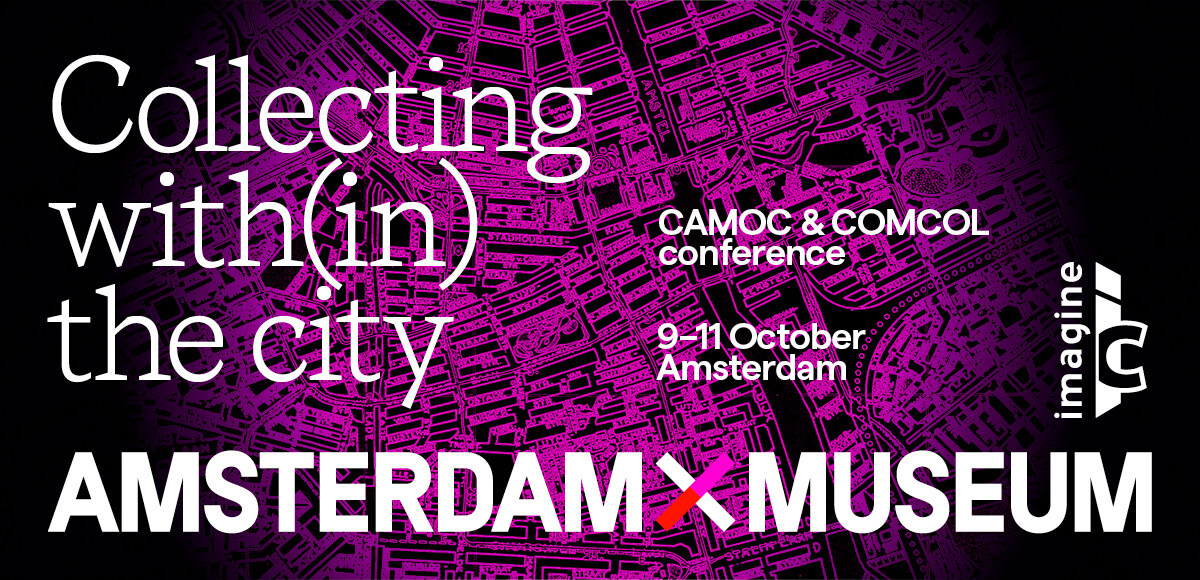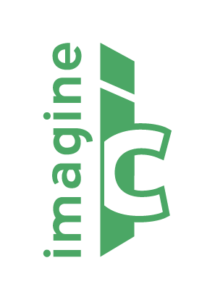2024 joint CAMOC-COMCOL annual Conference, Amsterdam

Collecting with(in) the City
Amsterdam 9-11 October 2024
CAMOC – COMCOL annual conference 2024
In partnership with the Amsterdam Museum and Imagine IC
Collecting with(in) the City
CAMOC (ICOM Committee for Collecting and Activities of Museums of Cities) and COMCOL (ICOM Commitee for Collecting) are partnering up for a joint 2024 annual conference in Amsterdam . “Collecting with(in) the City” will focus on revisiting collecting and (re)presenting in and with the city, by investigating the fluidity of the borders between museums and cities. The conference will be hosted by the Amsterdam Museum in partnership with Imagine IC and will focus on what collecting with and in a city means and how the museums and cultural heritage institutions of today do this.
Conference Theme:
With this core focus, we aim at considering some urgent conceptual questions together: What can museums capture beyond objects? (How) can they collect city rhythms, sounds, or smells? Can you collect the people that create and use a city? How can contemporary collecting be inspired by existing collections, and how can looking at collections with new (outside) perspectives bring new insights? What remnants of the past live in the present and how do they manifest? How should museums care for new urban narratives and for the people they concern? When working on a new balance of expertise and expectations, what inequalities and power relations emerge in (city) museums? How do shifting ideas about ownership and authority affect collecting and exhibiting practices?
For museums, these questions are becoming ever more relevant, as the balance between tangible and intangible heritage is shifting. Museums and heritage institutions are collecting not only objects but also stories and experiences. And increasingly they do so in various participatory forms with inhabitants, who can become partners in co-creation processes and projects. Thus, as collecting cities may include contemporary urban spaces, as well as urban lives and urban narratives, these questions also touch on critical discourses on power, reciprocity, and impact. Who can/do you partner with? What does this process of collaborating with networks and communities in a city look like? What makes collaborations mutually beneficial? In other words, collaborative and participatory collecting raises various issues worth studying, from ethics and legalities to sociological and psychological questions, as well as, of course, from a museology perspective.
Please find our complete Call for Papers here in pdf.
Program Overview
9 October:
Start with city Tours – Exploring Amsterdam
Morning: Breakfast at Imagine IC and program in Amsterdam Southeast
Afternoon: Explore other parts of the city of Amsterdam
Evening: Welcoming/opening drinks at the Amsterdam Museum (Amstel 51) from 17-19.00h
10-11 October:
Conference days at Pakhuis de Zwijger with keynotes, dialogue sessions, papers, practices, posters, artistic interventions, workshops and highlight sessions.
12 October: COMCOL members day with interactive program at Imagine IC, Amsterdam Southeast
Conference Registration Information
Information on pricing and registration as well as lodging options and recommendations can be found on the conference website: https://www.amsterdammuseum.nl/en/camoc-comcol-conference-2024. Please click the link for more information.
Early-birds tickets can be acquired until the end of July. The direct link for registration and ticketing is: https://ticket.amsterdammuseum.nl/en/camoc-comcol-conference-2024/tickets
Contact and Further Questions
If you seek financial support for physical attendance, the following options are available. Some ICOM’s national committees give out travel grants to attend conferences. To find out more, reach out to your national committee. There are also (limited) grants available for CAMOC and COMCOL members.
For any questions for CAMOC, please send an email to secretary.camoc@icom.museum
For any questions for COMCOL, please send an email to secretary.comcol@icom.museum
Scientific committee on behalf of CAMOC and COMCOL:
Leen Beyers, Andrea Delaplace, Danielle Kuijten, Flora Nguye Mutere, Annemarie de Wildt
More about our local partners:
Amsterdam Museum
The Amsterdam Museum is a progressive multivocal city museum where activities and exhibitions are organized on the most diverse subjects, for and by Amsterdammers. The city and its inhabitants are always the protagonists. Historical and contemporary (art) objects and stories are combined and complemented with the creativity and critical eye offered by contemporary artists. Which makes the museum an important public place for encounters in the center of the city. The main location of the Amsterdam Museum in the city centre is closed due to renovation. The Amsterdam Museum is therefor, located temporarily at Amstel 51. There the Amsterdam Museum presents its permanent collection, plus a range of temporary exhibitions, public programs, and children’s activities.
In its permanent collection presentation, Panorama Amsterdam: A Living History of the City, the Amsterdam Museum relates the traditional history of Amsterdam alongside counter-narratives or lesser-known and more recent histories of the city. The museum’s approach involves both familiar and seldom-seen works from its collection of more than 100,000 objects. Beyond that, residents and lovers of the city also lend their voices in changing exhibitions that reveal “their” Amsterdam. In particular, these exhibitions and the related programming allow visitors to see how the city is not limited to just one history.
The galleries surrounding the main hall are occupied by continually changing exhibitions on various topical subjects. Here, stories from the city as it is today, are told together with its residents. The exhibitions are replaced every half year, making room for new storytellers and new narratives from the capital. Highlighted are themes ranging from fashion, the colonial past, war and conflict, and the origins of New York City (New Amsterdam), the women of Amsterdam, and figures from Amsterdam’s history. Moreover, at its temporary home in H’ART Museum, the Amsterdam Museum will continue to host an extensive educational and public program.
Last year the Amsterdam Museum welcomed almost 190.000 visitors at its various locations.
For more information please visit: https://www.amsterdammuseum.nl
Imagine IC:
Imagine IC is an open space for heritage conversations. Based in Amsterdam Southeast where they share the house with the public library it brings together museum and archival practices. They strive for a society in which everyone participates equally. For a city in which all voices count.
Because heritage tells who we are together and who we want to be and become, everyone has a voice in this. Imagine IC is therefore an open floor for negotiations about the composition of the Amsterdam collection and ultimately also beyond. Who is the our in our heritage.
With many different people they give meaning to the things that matter. Innovating the way it is discussed. Constantly looking at the different perspectives in an ambition for heritage democracy.
Imagine IC shares their expertise with partners in the heritage field and develops democratic heritage methodology.
In their house at the Bijlmerplein they have year-round exhibitions created in and with their networks.
For more information please visit: Imagine IC – Heritage up to date! Heritage democracy from the South East
![]()
![]()
